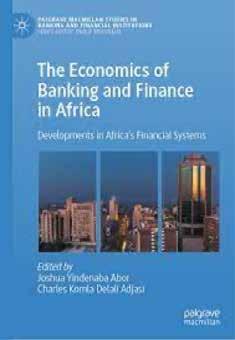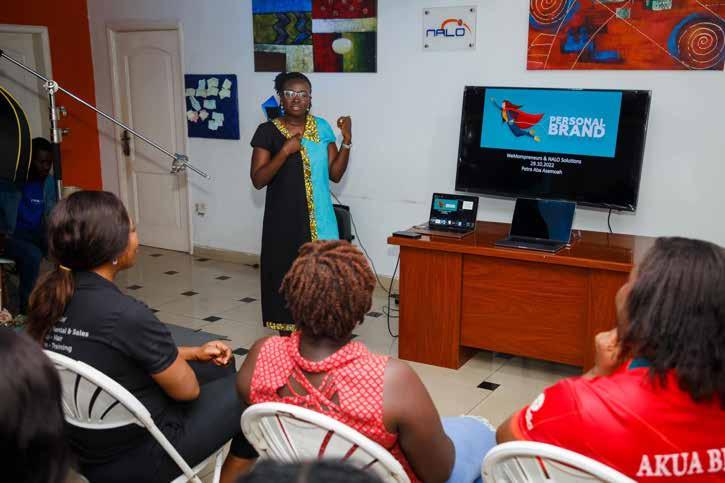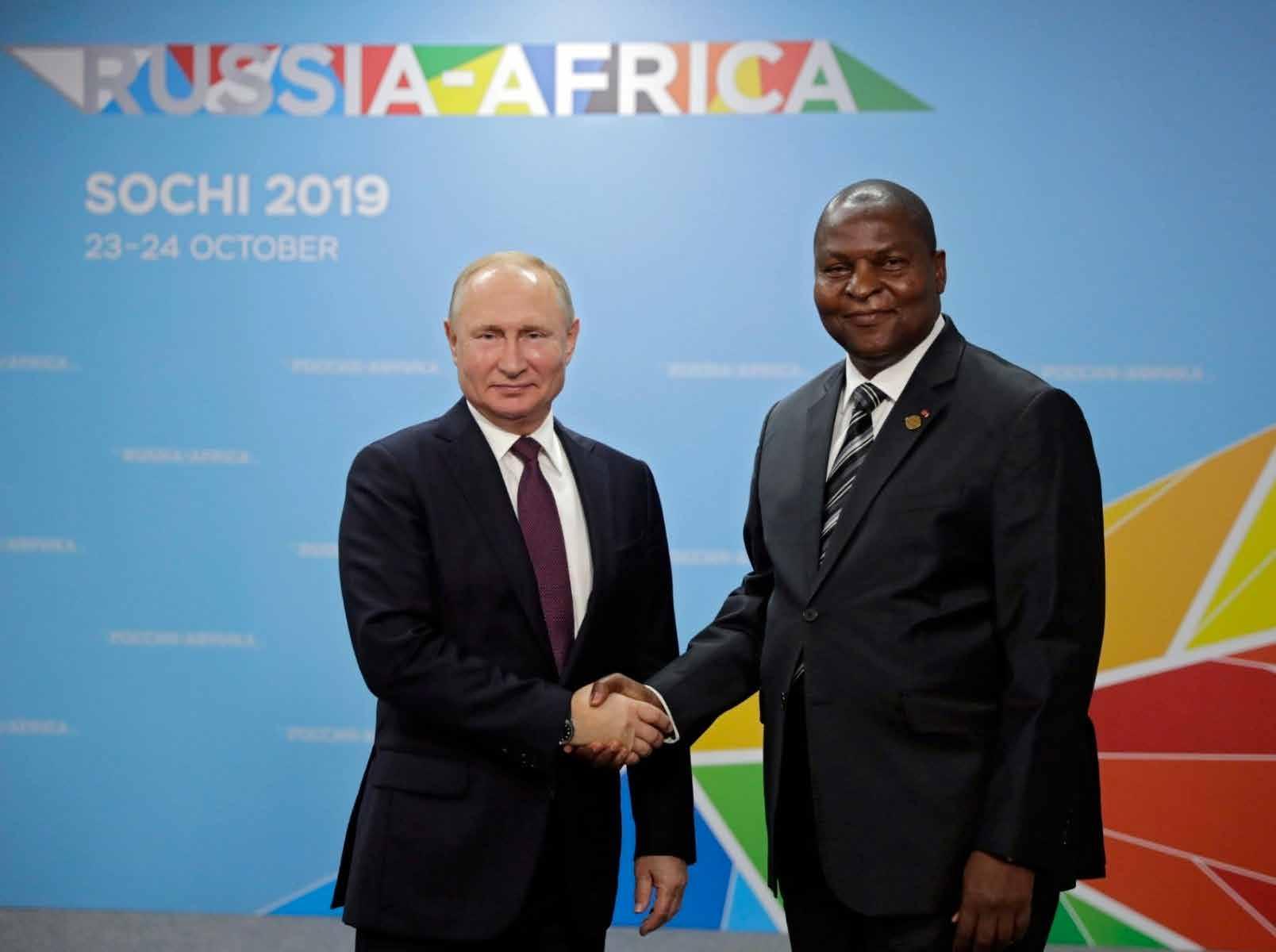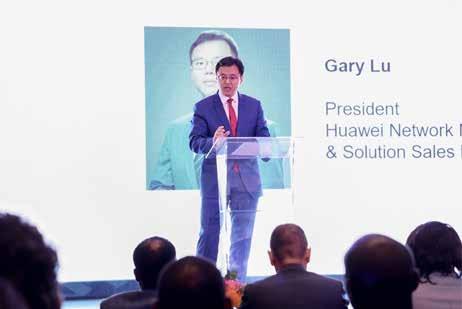














Ghana's Trade and Industry Minister Alan Kyerematen has called on African leaders to develop a new strategic framework to reshape the fortunes of industrialisation on the continent.


The industrialisation specialist, who has championed the successful implementation of Ghana's One District One Factory (1D1F) agenda, urged African leaders to map out a master strategy to boost the industri al revolution on the continent.
Speaking at the 17th Extra Ordinary Session of the Africa Union (AU) on Industrialisation and Economic Diversi cation on behalf of Presi dent Nana Aku o Addo, the Trade Minister did not mince words in celebrating the fortunes of the industrial sector.
He emphasised the immense pros pects the industrial, coupled with the availability of huge natural resources could bring to the conti nent.
ing and controls less than 4% of global trade.
"The answer to this paradox is for Africa to industrialize and add value to its natural resources. It is not by coincidence that the most powerful economies in the world also happen to be the most industrialized.
"It is against this background that I wish to commend highly the e orts of the AU Commission in bringing a new impetus for the industrialization of our continent", Mr. Kyerematen said at the continental summit in Niamey, Niger.
He noted that the industrialisation process comes with the outlay of huge nancial resources, among others, but urged African leaders to adopt measures that will help to make this possible.
"Excellencies, as we are all aware, industrialization does not occur by chance or happen overnight. Africa
Africa’s Industrialization, learning from the experiences of the imple mentation of AIDA.

"Africa cannot industrialize with out investment capital. African Governments will therefore need to introduce business regulatory reforms that will attract private capital, both domestic and foreign, into industrial development activi ties", the Trade and Industry added.
He cited the example of Ghana as a case study where the comprehen sive 10 point for industrialization led by the One District One Factory was developed.
"Excellencies, in Ghana we have launched and are implementing a Comprehensive Ten Point Plan for Industrial Transformation which includes amongst others, the agship “One District One Facto ry” Initiative which seeks to decen tralize industrialization, and the
The industrialisation specialist, who has championed the successful imple mentation of Ghana's One District One
Factory (1D1F) agenda, urged African leaders to map out a master strategy to boost the industrial revolution on the continent.

Speaking at the 17th Extra Ordinary Session of the Africa Union (AU) on Industrialisation and Economic Diversi cation on behalf of President Nana Aku o Addo, the Trade Minis ter did not mince words in celebrat ing the fortunes of the industrial sector.
He emphasised the immense pros pects the industrial, coupled with the availability of huge natural resources could bring to the conti nent.
Mr. Kyerematen asked African leaders to seriously embrace indus
trialization as it is the surest means out of the deep poverty and large levels of unemployment facing their people, adding the di culties most African countries faced in the outbreak of the COVID-19 pandem ic and Russia- Ukraine war should be a wakeup call.
"Excellencies, It is a paradox of history that although Africa controls most of the strategic mineral resources of the world, has almost 60% of all arable lands, is endowed with the most exten sive water bodies and has some of the richest forest resources, Africa still accounts for only 1.9% of global manufacturing and controls less than 4% of global trade.
"The answer to this paradox is for Africa to industrialize and add value to its natural resources. It is not by coincidence that the most powerful economies in the world also happen to be the most industrialized.
"It is against this background that I wish to commend highly the e orts
huge nancial resources, among others, but urged African leaders to adopt measures that will help to make this possible.
"Excellencies, as we are all aware, industrialization does not occur by chance or happen overnight. Africa will industrialize only if we plan for
tion, learning from the experiences of the implementation of AIDA.
"Africa cannot industrialize with out investment capital. African Governments will therefore need to introduce business regulatory reforms that will attract private capital, both domestic and foreign,
was developed.
"Excellencies, in Ghana we have launched and are implementing a Comprehensive Ten Point Plan for Industrial Transformation which includes amongst others, the agship “One District One Factory” Initiative which seeks to decentralize


According to him, it will ensure non-proliferation of charges at the Ports, arbitrary increases of charges and ensure service quality and value for money.
Speaking at the 25th Annual General Meeting of the Ghana Institute of
By Eugene DavisFreight Forwarders at Koforidua in the Eastern Region last Friday, he said “To ensure competitive business environment, we need to harmonize and standardize shipping line charges, negotiate for minimum service standards and more importantly, build strong regulatory framework for enforce ment and compliance. This will ensure non-proliferation of charges at the Ports, arbitrary increases of charges and ensure service quality and value for money.”
He also encouraged freight forwarders to leverage on technol ogy and build capacity and partnerships across the global supply value chain which could provide a competitive advantage in the service provision that members are abreast with modern trends in the industry.
Government, he said has embarked on a sustained programme to improve upon the transport infrastructure through road network rehabilitation and expansion, railways rehabilitation and re-development as well as
expansion and modernization of our various ports.
“At the moment, expansion works at the Tema Port to increase its capaci ty to handle increasing volumes of tra c has been completed. At the Takoradi Port, the development of the rst phase of the On-dock Multi-purpose Terminal has also been completed. The transit corri dors have been freed from most of the inspection barriers which hither to caused unnecessary delays and increased the cost of transportation to landlocked countries. The Paper less Port System introduced in 2017 has resulted in improvement in the e ciency of our ports through reduction in cargo clearance time, revenue optimization and business friendly environment.
In the Aviation sector, we are upgrading the Kumasi and Tamale airports into an international status. At the same time, we are also estab lishing a National Airline with a Private Strategic Partner to support our vision of positioning Ghana as an Aviation Hub of West Africa and beyond. I have no doubt that with these interventions, the industry
would take advantage of the oppor tunities that abound in order to grow and remain competitive.”
The African Continental Free Trade Area (AfCFTA), which aims to boost intra-African trade and promote industrialization, presents once-in-a-lifetime opportunity, and for Mr. Asiamah, government is determined to invest in logistics
ing continental market. This includes ports, roads, and railway system development, as well as warehousing improvements, partic ularly with the emergence of new trade routes.
“Freight operations along the Volta Lake could be enhanced with the completion of the Mpakadan railway line. However, it will require
of volumes and targeted commodi ty trade to have greater impact. For example, the transit of dry bulk and liquid bulk products destined for Northern Ghana and beyond. Once again, I wish to take this opportunity to encourage you to take full advantage of the facilities being put in place to grow and expand your business particularly on the continent.”
He also called for a sustainable shipping in the industry, citing interventions from government through environmentally friendly ports, promoting regulations for green shipping through technology and renewable energy along the shipping value chain. “Therefore, ensuring green logistics operations across the logistics value chain is a strategy that we must all pursue in
key sector rice players in Thailand for the establishment of Seed Devel opment and Research Centre, Rice Mechanisation Centres, Bio-organic Fertiliser Production Centres, Supply of Farm Implements and Rice Mills in Ghana.
The completion of the above facili ties will help boost rice production in the country which will drastically reduce its importation.
Presenting the 2023 Budget in Parlia ment last week, the Minister of Finance, Ken Ofori-Atta, said as part of e orts to promote exports, the government will expand the produc tive capacity in the real sector of the economy and actively encourage the consumption of locally produced rice, poultry, vegetable oil and fruit juices, ceramic tiles among others.
In the light of the above, the rst batch of the technical team from Thailand is expected to arrive in Ghana in December, this year.

The team was in Thailand to under study the Thai rice sector in order to replicate their experiences and strategy in Ghana.
The intention of Jospong Group of Companies is to partner with major rice industry players in Thailand to provide technical and equipment support for the entire rice value chain in Ghana with the aim of producing rice for the local and export market.
The JGC delegation was supported by the High Commissioner of Ghana in Malaysia in charge of Thailand and other South-East Asian coun tries, H.E Mrs. Florence Akonor, In her remarks, the High Commis sioner indicated that the rice project marks another level of bilateral cooperation between Thailand and Ghana for mutual bene ts.
She expressed deep appreciation to the Honorary Consul, Dr. Sicha Singsomboon, and her team for
was fundamental for deepening cooperation to improve the econo mies of both countries, especially for rice production.
Addressing a press conference on the sidelines of the trip in Bangkok, the Executive Chairman, Dr. Joseph Siaw Agyepong, called on players within the Ghana rice value chain to collaborate for the devel opment of the industry.
The importation of rice into Ghana exceeds 60% annually, with dire economic consequences. Between 2007 and 2015, the amount spent on imported rice rose from $151m to $1.2bn per annum, with domes tic consumption supplemented by imports primarily from Thailand, Vietnam and India. Ghana’s annual rice importation, which currently stands at 1.3billion USD, continue to increase year after year. This negative narrative in the rice sector can only be changed with the injec tion of massive capital by big sector players from the private sector. The decision of JGC heeding to the
ing lives of people through provi sion of solutions to problems.
Already, JGC has commenced its 100,000acres of rice production, with land banks secured. The Group intends to partner with the Ghana Rice Inter-professional Body (GRIB) and other local rice players to achieve this vision. The project involves integrated rice farming methods ranging from seed development, paddy cultiva tion, milling, packaging and marketing. The delegation visited and discussed with captains of industry in the rice sector in Thai land. This included Thai Farmers Lifestyle and Learning Centre, rice equipment manufacturers such as Kubota, Satake and Deler Engi neering Services as well as Thai EXIM Bank. The Thai EXIM Bank was impressed and thus expressed its readiness to support JGC. The delegation also visited Fertiliser manufacturers, Institute of Food Research and Product Develop ment, Kasetsart University.
nancial systems is provided. Addi tionally, the purpose of the book as well as an overview of the chapters in the book are provided.
The global economy is going through a di cult period; one that has been engendered by recent develop ments, notably the COVID-19 pandemic and the Russian-Ukraine war. Indeed the adverse e ects of the current economic shock is yet to be fully realized. The extent and duration of this adverse economic impact on countries will to a large extent be dependent on the banking and nancial systems. It is not surprising therefore that policymak ers, governments, institutions, regu lators and nancial market practi tioners are all working hard to mitigate the adverse e ects of these shocks on the banking and nancial systems.
Thus this recent book on The Economics of Banking and Finance in Africa, edited by two astute nan cial economists and published by Palgrave Macmillan (Springer Nature) – could not have been timeli er. It presents a comprehensive resource on banking and nance that students, researchers and prac titioners interested in Africa’s nan cial systems would nd very useful. The book has thirty chapters grouped under seven broad parts. In Part I a broad overview of Africa’s
Part II of the book has 4 chapters and covers topics related to FinTech, Financial inclusion and Banking Sector Development in Africa. In this part of the book the relationship between in ation, interest rates and exchange rates in Africa is discussed. Also there is a chapter that looks at competition and market structure and how reducing information asymmetry will reduce monopolistic power of the banking sector in Africa. Anoth er chapter also discusses how increased nancial inclusion complements banking sector devel opment and stability in the nancial system in Africa. The last chapter in this part of the book discusses the development of FinTechs and their implication for banks and nancial services in Africa.

In Part III, issues relating to Central Bank independence and monetary policy are discussed in 5 chapters. The rst chapter in this part of the book looks at how increased inde pendence of Central Banks have helped improve e ectiveness of monetary policy in the management of in ation and how this e ective ness di er by the exchange rate regimes. Another chapter explores how the central Bank independence promotes nancial development in Africa by making monetary policy more credible. There is another chapter that discusses credit infor mation sharing institutions and how that has complemented nancial market developments in Africa. The remaining two chapters in Part III discusses the relationship between monetary policy and risk taking behavior of banks, and also how monetary policy mediates the e ect of banks pricing behavior on nan cial inclusion in Africa.
Three chapters on Structured Finance, sustainable nance and
Islamic Banking are discussed in Part IV. One chapter discusses how the structure of nance could be employed to respond to the chang ing nancing demands of corpo rate rms and governments. This is then followed by a chapter that looks at the trends in policies, prac tices and challenges of sustainable nance and banking in Africa. The last chapter in this section provides an overview of Islamic banking and nance as an important alternative to conventional models in the face of recent experiences of nancial crisis.
In Part V, the banking crisis as well as the implications of global bank ing for Africa are discussed in 4 chapters. The rst of these chap ters looks at the causes, conse quences or e ects of banking failures in Africa. The chapter that follows examines the impact of cross-border banking on the likeli hood of banking crisis in Africa. Another chapter discusses how cross border banking and bank pricing a ects nancial inclusion in Africa. The last chapter in this section of the book discusses current developments, challenges, opportunities and the future of global banking and what their implication are for African banks.
Part VI comprise of 5 chapters that treat topics relating to banking regulation and supervision. It starts with a discussion of risk man agement and compliance in bank ing in Africa. This is then followed by a chapter that examines how country-level governance struc tures a ect the relationship between nancial sector transpar ency, regulations and banking stability in Africa. The next chapter then discusses the role that mone tary policy plays in shaping the relationship between macro-pru dential regulations and what it means for the likelihood of a bank ing crisis in Africa. This is followed by a chapter that provides an over
view of recent developments in banking regulations and supervi sion in Africa. The last chapter in this section discusses the challeng es confronting the adoption of supervisory and regulatory technology in Africa.
In the last section of the book, Part VII, issues relating to non-Bank Financial Markets are discussed in 8 chapters. This section of the book starts with an overview of the sustainability, growth and impact of micro nancial institutions (MFIs) in Africa. This is then followed by a discussion of the nature and characteristics of insur ance markets in Africa. Another chapter also discusses the role of pension reforms, pension markets and capital market developments in Africa’s pension market. This is followed by two chapters that discusses respectively the stock market developments, and bond market development in Africa. There is a chapter that also discuss es the relationship between private capital ows and energy use in Africa. The penultimate chapter discusses the relationship between foreign direct investments and stock market development in Sub-Saharan Africa. The nal chap ter discusses how African govern ments have responded to pandem ics generally, and with emphasis on the Covid-19 pandemic and Africa’s nancial systems.
One concludes by noting that this book is extremely rich as it blends academic excellence with exten sive practical experience. This undoubtedly is one of the most comprehensive books in contem porary times on the nexus between, Banking, Finance and economic development in Africa.
 Professor Robert Darko Osei Dean, School of Graduate Studies, University of Ghana, Legon
Professor Robert Darko Osei Dean, School of Graduate Studies, University of Ghana, Legon

The Spanish Embassy in Ghana, through its Economic and Commer cial O ce has organized this year’s edition of the Spanish wine show in Accra, on Thursday 24th November 2022 at the Kempinski Hotel Gold Coast City, Accra.
This year’s event is the seventh edition and forms part of e orts by the Spanish Embassy in Accra through its a liates in its quest to strengthen the commercial and economic bond between Ghana and Spain.

Dubbed “Wines from Spain: Spirits of Spain” the annual event, brought together a great variety of Spain’s beverages, such as wine, sparkling wine, beer, vermouth and other alcoholic beverages .
Besides the wine tasting, the event also focused on enhancing educa
tional and sensory experiences linked to wine and other beverages. And more importantly, the di erent grape varieties and other products that are grown in Spain as well as their geographic distribution.
Speaking after the exhibition, Head of the Economic and Commercial O ce at the Spanish embassy, Miguel Casero highlighted the importance of the wine sector in Spain, the world’s third-largest wine-producing country.
He also acknowledged the positive trend in the demand for Spanish wine in Ghana over the years.
“The numbers said that Ghana is very important for Spain. For exam ple, Ghana is the fourth country that exports the most wine of all Africa and Ghana accounts for almost 10% of the total wine export of Spain to
Africa. So, this is a sense of the importance and the current situa tion and the current awareness of Spanish wines here in Ghana.
“There are some positive trends in the last few years. For example, from 2019 to 2020, there was an increase of 40% of the wine export and from 2020 to 2021, there was an increase of 7%. So you can see there is some positive trend and we see that more and more Ghanaians are getting to know of the Spanish wines and they are really liking it” he added.
He expressed gratitude to Ghana ian importers, the press, wine shops, restaurants, supermarkets, and customers who promote Span ish beverages in Ghana with their passion and dedication.
“I would sincerely like to thank all
of you who are part of the wine and beverage community in Ghana for your dedicated support and passion for Spanish products. It is your cooperation with Spain and your valued appreciation of Span ish products that has made it possi ble”
Since 2015, the O ce has been successfully organizing wine tasting for professionals in the hospitality industry, with more than 80 professionals attending each year and this year was no exception.
The trade show o ered more than 70 di erent products, including wine, beer, vermouth, and other alcoholic beverages from Spain, with the collaboration of 3 Ghana ian importers and 8 Spanish winer ies and beverage companies.
The Project Manager of the GrEEN Innovation Challenge at SNV Ghana, Laouali Sadda believes the youth are a driving force for required socio-economic development and supporting the growth of emerging entrepreneurs, will be the objective of the project.
The GrEEN project is aimed at supporting green businesses who have innovative products and services in SNV’s three sectors; agriculture, renewable energy and energy e ciency and Water, Sanita tion and Hygiene (WASH) in the Ashanti and Western regions of Ghana.
SNV, under its Boosting Green Employment and Enterprise Oppor tunities in Ghana (GrEEn) Project, launched the GrEEn Innovation Challenge in June 2021 to award matching grants to selected businesses in Ghana’s green sector located in the Ashanti or Western
regions of Ghana, where the GrEEn project is being implemented.
The GrEEN project is a four year initiative and in its third year about to end, Mr. Sadda told journalists on the side of the GrEEn Innovation Challenge Awards last Friday that “ We are ending the third year, so we have one remaining year to consoli date and see how we can work on sustainability for both youth that has been selected and supporting also the smes.”
Timothy Dolan, Team Leader Macroeconomics and Trade Section, Delegation of the European Union to Ghana said the European Union con rms its commitment to supporting green businesses and entrepreneurs. “At COP27, we pushed for increased e orts at the global level that tackle the climate and biodiversity crises occurring across the world and a ecting, espe cially developing, countries.
support for Ghanaian green businesses is a major focus for the EU.”
The GrEEn Project, with its GrEEn Innovation Challenge, is one of the many projects the EU is using to support climate adaptability and create growth of local businesses, Mr. Dolan noted.
Multi-sector committees, made up of public and private sector institu tions in the Ashanti and Western regions evaluate applicants and recommend green businesses to be awarded the matching grants.
In December 2021, the maiden GrEEn Innovation Challenge was held, and 12 green businesses were awarded a matching grant of one million, one hundred and seventy thousand cedis (GHS 1,170,000.00). They included 6 businesses in the Ashanti region, 5 in the Western region and 1 in the
Greater Accra region who estab lished an outlet in the Western region.
In August 2022, SNV Ghana, along with the European Union launched the 2022 GrEEn Innovation Chal lenge for only green businesses enrolled in the GrEEn Incubation and Acceleration Programmes, a 6-month free business advisory support training provided to green businesses and entrepreneurs in the two regions of the project.
Out of over 70 applications received, 32 (17 from Western Region, 15 from Ashanti Region) were shortlisted to go through a two-day pitch event from 27th and 28th October 2022 in Accra where a panel, including representatives from the European Union Delega tion to Ghana, Fidelity Bank, Kosmos Innovation Centre, Ghana Enterprises Agency, Holland Greentech, and the United Nations
Capital Development Fund (UNCDF) and SNV Ghana, analysed their appli cation and interviewed them on their green products and services.
EU gives matching grant of over GHS 2.34m
Following the pitch event, a due diligence exercise was conducted and 15 businesses who meet the requirements of the GrEEn Innova tion Challenge were selected to be awarded the matching grant at the 2022 GrEEn Innovation Challenge Award ceremony held at the African Regent Hotel on Thursday, 24th November 2022. They include 7 businesses in the
Ashanti region, and 8 from the West ern region. The grants to be awarded are as follows: Charlotte Adu-Ansah of Chabed Enterprise with an amount of 7,000 euros, equivalent of GHc90,020, Emelia Anderson [Emmy's Shop Afrik] received 10,000euros equivalent of GHc128,600, Vida Aniagyei [Aniwasu Garments] who received 10,000euros equivalent of GHc128,600, Elizabeth Bayo [Nasag Lach] received 10,000euros equivalent of GHc128,600 , Prince Adjei [Moreplex Company Ltd] received 10,000 euros equivalent of GHc128,600.

Others are Richard Arthur from
Brofoshelle Ventures who received 10,000euros representing GHc128,600, Gideon Nyamesen [AgriCentric Ventures] 10,000eu ros equivalent of GHc128,600, Ko Ackon [Uvuko Company Ltd] received 10,000 euros equivalent of 128,600 euros, David Nkansah [Davnak Ventures]] 10,000 euros equivalent of GHc128,600, Amadu Sulemana from Kozobiz Biogas Technology also received 10,000euros equivalent of GHc128,600, Georgina Odoom [Ginadoom Waste Management Services ] received 15,000 euros equivalent of GHc192,900, Matilda Stem [Asaasepa Naturals] received 15,000euros equivalent of

GHc192,900, Millicent Lambog [Eggs and More] received 15,000euros equivalent of GHc192,900, Laminu Issaka [Romil la Farms] received 15,000 euros equivaelent of GHc192,900 and Emmanuella Appiah of Green Ecoworks received 25,000euros representing GHc321,500.
All the grant monies amounted to EUR 182,000 equivalent of GHC 2,340,520.
GrEEn is a agship for the EU in Ghana, and works hand-in-hand with its partners UNCDF and SNV in project implementation.


networks of private security companies for gathering actionable intelligence is vast. This advantage, he said must be harnessed by state security agencies to help in the ght
networks of private security companies for gathering actionable intelligence is vast. This advantage, he said must be harnessed by state security agencies to help in the ght against crime.
and focus of private security is detection and prevention of harm, misappropriation or unauthorized access/use of a property.”
and focus of private security is detection and prevention of harm, misappropriation or unauthorized access/use of a property.”
Ghana's top provider of Bulk SMS services, NALO Solutions Limited, has organized a workshop on personal branding and photography sessions for women in business in collaboration with WeMomprenu ers, a women advocacy organisation. The workshop, which was facilitated by Petra Aba Asamoah, a marketing executive and author, forms part of NALO Solutions' Corporate Social Responsibility (CSR) initiative, which aims to empower female-led businesses across the nation.
The two-in-one programme taught participants the value of personal branding as Small and Medium Enterprise (SME) business owners, and it also provided them with the opportunity to have professional photographic shot of themselves and their products.
“A close collaboration between private and public security agencies would lead to a mutu ally bene cial information sharing arrangements; with each party tapping into each other’s superior competencies for a better security architec ture. Private security compa nies provide security to an overwhelming majority of the country’s infrastructure with a large number of purposefully positioned security guards”,
impact on an organization's success.
“A close collaboration between private and public security agencies would lead to a mutu ally bene cial information sharing arrangements; with each party tapping into each other’s superior competencies for a better security architec ture. Private security compa nies provide security to an overwhelming majority of the country’s infrastructure with a large number of purposefully positioned security guards”, he said.
Petra Aba Asamoah, who took the women leaders through a presenta tion on personal branding noted that a brand forges an important connec

The Managing Director of Edern Security Services Limited, Mr. Emmanuel Quartey, has indicat ed that a strong collaboration between public security agen cies and private security compa nies is needed to help ght
Security Services Limited, Mr. Emmanuel Quartey, has indicat ed that a strong collaboration between public security agen cies and private security compa nies is needed to help ght
He said that although there is inadequate information about the infrastructural base of private security companies in Ghana, nevertheless the human capital base and security
personal brand is thinking about legacy. Aside from the aesthetics, therefore, I encourage you all to be women who have the substance to match the perception you present,” she added.
He was speaking at a breakfast meeting with senior sta of the company across the country to create awareness on the nega tive impact of terrorism and the role of private security in curbing the imminent danger. He stated that, “over the years, private security has been designed to augment the activi ties of state security. Private security is the provision of security by a person other than a public servant to protect a person or property. The remit
“Our objective is to help support female-led businesses to project themselves as leaders in their various industries. There is no denying the importance of person al branding in today’s world. Whether you are a small business owner or a corporate executive, crafting a strong personal brand can make all the di erence in terms of success,” he said.
He said that although there is inadequate information about the infrastructural base of private security companies in Ghana, nevertheless the human capital base and security
He was speaking at a breakfast meeting with senior sta of the company across the country to create awareness on the nega tive impact of terrorism and the role of private security in curbing the imminent danger.

He stated that, “over the years, private security has been designed to augment the activi ties of state security. Private security is the provision of security by a person other than a public servant to protect a person or property. The remit
He emphasized that creating a strong personal brand can help people nd chances that would future-proof their careers and increase their visibility and credi
According to Mr. Quartey, law enforcement agencies can gather information about incidents through reporting by private security sta ; gain additional ‘work-force’ (force multiplier) by relying on private security; prepare private security companies to assist in emergencies and coordinate e orts to safe guard the nation’s critical infrastructure. Private Securi ty Companies on the other hand can also gain informa tion from law enforcement regarding threats and crime trends and coordinate plans for evacuation and transpor tation during emergencies. Edern Security Services Lim ited (ESSEL) is a registered company licensed to provide private security services in Ghana by the Ministry of Inte rior. Edern Security has branches in all 16 regions across the country, with professionally trained securi ty guards providing services to institutions operating in di erent sectors of the econ
According to Mr. Quartey, law enforcement agencies can gather information about incidents through reporting by private security sta ; gain additional ‘work-force’ (force multiplier) by relying on private security; prepare private security companies to assist in emergencies and coordinate e orts to safe guard the nation’s critical infrastructure. Private Securi ty Companies on the other hand can also gain informa tion from law enforcement regarding threats and crime trends and coordinate plans for evacuation and transpor tation during emergencies.

Edern Security Services Lim ited (ESSEL) is a registered company licensed to provide private security services in Ghana by the Ministry of Inte rior. Edern Security has branches in all 16 regions across the country, with professionally trained securi ty guards providing services to institutions operating in di erent sectors of the econ
“I believe personal branding plays a key role in today’s world. It can propel you and connect you to people who can help you grow and expand your business. Your personal brand, as an individual, increases your market value and has a direct impact on the way people see your business. Every body wants to be associated with greatness. It is imperative that we make it a conscious e ort to always portray our best selves. Most importantly we need to ensure what people see is what they get. Our attitudes and character must match the kind of brand we portray to the world,” he said.
The workshop was interactive as it made room for participants to share their experiences and active ly participate in its ques tion-and-answer session relating to how to build their personal brands
to which regulatory demands, particularly on individual identi ties, ultimately undermined demand. After all, the major trans actions currently conducted with crypto may be remittances from rich countries to developing econo mies and emerging markets, and capital ight in the other direction. In both cases, the parties’ desire to avoid exchange controls and taxes implies a premium on anonymity.
long emphasized. Perhaps regulators should push toward decentralized equilibrium by requiring that exchanges know the identity of anyone with whom they transact, including on the blockchain. Although this may sound innocent, it would make it rather di cult to trade on the anonymous blockchain on behalf of an exchange’s customers.
The epic collapse of wunderkind Sam Bankman-Fried’s $32 billion crypto empire, FTX, looks set to go down as one of the great nancial debacles of all time. With a storyline full of celebrities, politicians, sex, and drugs, the future looks bright for producers of feature lms and docu mentaries. But, to paraphrase Mark Twain, rumors of the death of crypto itself have been much exaggerated. True, the loss of con dence in “exchanges” such as FTX – essential ly crypto nancial intermediaries –almost surely means a sustained steep drop in prices for the underly ing assets. The vast majority of Bitcoin transactions are done “o -chain” in exchanges, not in the Bitcoin blockchain itself. These nancial intermediaries are vastly more convenient, require much less sophistication to use, and do not waste nearly so much energy.1 The emergence of exchanges was a major factor fueling cryptocurren cies’ price growth, and if regulators come down hard on them, the price of the underlying tokens will fall. Accordingly, Bitcoin and Ethereum prices have plummeted.

But a price adjustment alone is not the end of the world. The pertinent question is whether crypto lobbyists will be able to contain the damage.
Until now, their money has been speaking volumes; Bankman-Fried reportedly gave $40 million to support the Democrats in the United States, and his FTX colleague Ryan Salame reportedly gave $23 million to Republicans. Such largesse surely helped persuade regulators around the world to follow a wait-and-see approach to crypto regulation, rather than be perceived to be sti ing innovation. Well, they waited, and with the FTX crash, we must hope that they saw. But what will they conclude? The most likely path is to improve regu lation of the centralized exchanges –the rms that help individuals store and trade cryptocurrencies “o chain.” The fact that a multi-bil lion-dollar nancial intermediary was not subject to normal record-keeping requirements is stupefying, no matter what one thinks about the future of crypto. Of course, rms would face compli ance costs, but e ective regulation could restore con dence, bene ting rms aiming to operate honestly, which are surely the majority, at least if one weights these exchanges by size. Greater con dence in the remaining exchanges could even lead to higher crypto prices, though much would depend on the extent
On the other hand, Vitalik Buterin, the co-founder of the Ethereum blockchain and one of the crypto industry’s most in uential think ers, has argued that the real lesson of FTX’s collapse is that crypto needs to return to its decentralized roots. Centralized exchanges such as FTX make holding and trading cryptocurrencies much more convenient, but at the expense of opening the door to managerial corruption, just as in any conven tional nancial rm. Decentraliza tion can mean greater vulnerability to attack, but so far the largest cryptocurrencies, such as Bitcoin and Ethereum, have proven resilient.
The problem with having only decentralized exchanges is their ine ciency compared to, say, Visa and Mastercard, or normal bank transactions in advanced econo mies. Centralized exchanges like FTX democratized the crypto domain, allowing ordinary people without technical skill to invest and conduct transactions. It is certainly possible that ways to duplicate the speed and cost advantages of centralized exchanges eventually will be found. But this seems unlikely in the foreseeable future, making it hard to see why anyone not engaged in tax and regulatory evasion (not to mention crime) would use crypto, a point I have
True, there are alternatives involv ing “chain analysis,” whereby transactions in and out of a Bitcoin wallet (account) can be algorithmi cally examined, allowing the underlying identity to be revealed in some cases. But if this approach was always enough, and all semblance of anonymity could always be obliterated, it is hard to see how crypto could compete with more e cient nancial inter mediation options.
Finally, rather than simply banning crypto intermediaries, many coun tries may ultimately try to ban all crypto transactions, as China and a handful of developing economies have already done. Making it illegal to transact in Bitcoin, Ethereum, and most other crypto would not stop everyone, but it would certainly constrain the system. Just because China was among the rst does not make the strategy wrong, especially if one suspects that the main transactions relate to tax evasion and crime, akin to large denomination paper currency notes like the $100 bill.
Eventually, many other countries are likely to follow China’s lead. But it is unlikely that the most important player, the US, with its weak and fragmented crypto regu lation, will undertake a bold strate gy anytime soon. FTX may be the biggest scandal in crypto so far; sadly, it is unlikely to be the last.
Overtime is any work done beyond the regular working hours in a contract of employment. In today’s working environment most organiza tions work eight (8) hours per day,40 hours per week or some even run 12-hour shift. Overtime is mostly the extra hour’s work done by the employee outside the working contract. An allowance is usually payable to the employee for the extra time spent at work.
There are many reasons for overtime at workplace some of which include inadequate human resources, this situation negatively a ects e ciency, sta rationalization may be adopted as a strategy to enable organization meets certain targets. As a result, there may be an urgent need for employees to work beyond the agreed working hours stipulated in their respective contract of employment. If this occurs, management and employ ees would have to agree on the dura tion of overtime services needed to achieve set targets.
In addition, obsolete resources slow production. Mostly when machines
used at the workplace are old, its e ciency is a ected which negatively in uences productivity. This brings about delay in production at the workplace as well as reducing employee output and overall organi zational performance demanding employees to do extra hours work.
Furthermore, in situations of special assignments, overtime is needed and is paid to cater for such tasks that may require employees staying beyond the required working hours.
Finally, using many manual proce dures at work leads to overtime. Most organizations employ the use of manual work in its operation hence end up not meeting assigned task or target because the manual e ort is insu cient and ine cient in accom plishing task on time to meet manage ment expectation.
There will be more demand of overtime allowances by employees, which leads to increase income result ing in increased productivity. Some employees intend to do overtime to earn the admiration of management
to be considered for a higher position, the allowance paid for overtime serves as attractive pack age for the employee. Employers using overtime are also likely to impose too much pressure on their employees which can cause serious health challenge on them. The employer will then have to incur higher employee medical bills leading to high budget for the employer if is not well managed. If the amount paid for overtime is not well negotiated by the parties involved, in many instances, mostly employees have con ict with their employers on the amount to be paid if it is not clearly stated in the terms of the contract of employment on extra hours work.
Employees are likely to be e cient during the extra hours worked as compared to their normal working hours because they expect to have an additional income from overtime task. Hence, they may relax their working hours task with expectation to work into extra hours, for
overtime. Employers should replace obsolete machines that may cause delay in production and not exhaust employees’ e orts and which a ects employee’s health, safety and reduc es their productivity, performance and increase the workplace accident a ecting organizations overall performance.
Overtime means time worked in addition to one’s normal working hours. Every employer considers overtime as very expensive and for that matter allow overtime as and when its expedient. In summary overtime is used to clear backlogs or to accomplish task that is time bound. Employers are naturally not in favour of overtime since it increas es their wage bill reason why it is used sparingly. Nevertheless, most employees prefer over overtime since their income will increase when they work overtime. For management overtime needs to be managed prudently to achieve the desired results else it will lead to lackadaisical attitude in e ective employee time management.
Chairing a meeting of the Commis sion for Military Technology Cooper ation with Foreign States, Russian President Vladimir Putin has called for renewed e orts, not only in preserving but also in strengthening Russia's leading position on the global arms market, primarily in the high-tech sector, amid tough compe tition.
"Our capabilities in the military technical sphere must be used to modernise and upgrade all our industries, to support our science and to create a powerful technologi cal potential for the country’s dynamic development," Kremlin website o cially reported.
Putin further called for reliance on the rich experience in this sphere and building up consistently military technology cooperation with foreign states. Kremlin website further reported that Russia's global export of military products has been at a consistently high level, around $25 billion.
Russian manufacturers have the advantage of an unfailingly high quality of products, which have no analogue in their combat and techni cal characteristics. Russia values its
"We strictly observe international norms and principles in this area. We supply weapons and military equipment solely in the interests of security, defence and anti-terrorism e orts. In each case, we thoroughly assess the situation and try to predict the developments in the speci c region. There are no bilater al contracts ever targeted against third countries, against their securi ty interests," he explained.
Putin suggested that "the changing conditions in which we have to trade in military equipment require some adjustment of existing approaches and development of a new integrated strategy for the future."
Over the past years, strengthening military-technical cooperation has been part of the foreign policy of the Russian Federation. Aside Asia and Latin America, Russia has signed bilateral military-technical coopera tion agreement nearly with all African countries.
Putin explained that Russia is ready to distribute advanced weaponry across the globe, particularly in Africa, Asia and Latin America. "Russia sincerely cherishes the
the most modern types of weap ons," he underscored this point in his speech.
Our monitoring indicates that traditional importers of Russian weapons from Africa include Alge ria, Angola, Burkina Faso, Botswa na, Egypt, Ethiopia, Ghana, Libya, Morocco, Mozambique, Namibia, Rwanda, Sudan, South Africa, Uganda and Zimbabwe. Russia is still exploring the possibility of concluding agreements with a few more African countries.
Arguably, Dr Shaabani Nzori, a Moscow based Foreign Policy Expert, thinks that Russia's military-technical cooperation with African countries is appropri ate in Russia’s foreign policy but African leaders should also allocate enough money to spend on priori ty development projects in Africa.
"Over these years Russia has highly prioritized the military sphere in Africa. It shows clearly Russia's weak business engagement with Africa. Until now, we can’t point to completed Russian infrastructure projects in Africa. There are many investment areas. What is import ant these days is Russia has to go

ture and industries in Africa," Shaabani said in the interview discussion.
Russian Special Presidential Repre sentative for the Middle East and Africa and Deputy Foreign A airs Minister, Mikhail Bogdanov, told the global community "to go beyond military cooperation" to assist African countries that are still facing a number of serious devel opment problems.
"Joint e orts of the whole global community are required for meet ing those challenges, I am con dent that the aid to African states should go beyond military compo nents. It is necessary to fortify public institutions, engage in sustainable economic develop ment, construct infrastructure facilities, create new jobs," Bogdan ov said, adding "those are the ways of solving such problems as migra tion, for example, to Europe."
Bogdanov was contributing to the panel discussions on the topic: "Engaging Africa in Dialogue: Towards a Harmonious Develop ment of the Continent" at the Dialogue of Civilisations Forum that was held from October 5-6 in

Chairing a meeting of the Commis sion for Military Technology Coop eration with Foreign States, Russian President Vladimir Putin has called for renewed e orts, not only in preserving but also in strengthening Russia's leading position on the global arms market, primarily in the high-tech sector, amid tough compe tition.
"Our capabilities in the military tech nical sphere must be used to mod ernise and upgrade all our indus tries, to support our science and to create a powerful technological potential for the country’s dynamic development," Kremlin website o cially reported.
Putin further called for reliance on the rich experience in this sphere and building up consistently military technology cooperation with foreign states. Kremlin website further reported that Russia's global export of military products has been at a consistently high level, around $25 billion.
Russian manufacturers have the advantage of an unfailingly high quality of products, which have no analogue in their combat and techni cal characteristics. Russia values its reputation of being a conscientious and responsible participant in military technology cooperation.
"We strictly observe international norms and principles in this area. We supply weapons and military equipment solely in the interests of security, defence and anti-terrorism e orts. In each case, we thoroughly assess the situation and try to predict the developments in the speci c region. There are no bilater al contracts ever targeted against third countries, against their securi ty interests," he explained.
Putin suggested that "the changing conditions in which we have to trade in military equipment require some adjustment of existing approaches and development of a new integrated strategy for the future."
Over the past years, strengthening military-technical cooperation has been part of the foreign policy of the Russian Federation. Aside Asia and Latin America, Russia has signed bilateral military-technical cooperation agreement nearly with all African countries.
Putin explained that Russia is ready to distribute advanced weaponry across the globe, particularly in Africa, Asia and Latin America. "Russia sincerely cherishes the historical strong, friendly, truly trusting ties with the states of Latin America, Asia, and Africa and is ready to o er its partners and allies
the most modern types of weap ons," he underscored this point in his speech.
Our monitoring indicates that traditional importers of Russian weapons from Africa include Alge ria, Angola, Burkina Faso, Botswa na, Egypt, Ethiopia, Ghana, Libya, Morocco, Mozambique, Namibia, Rwanda, Sudan, South Africa, Uganda and Zimbabwe. Russia is still exploring the possibility of concluding agreements with a few more African countries.
Arguably, Dr Shaabani Nzori, a Moscow based Foreign Policy Expert, thinks that Russia's military-technical cooperation with African countries is appropri ate in Russia’s foreign policy but African leaders should also allocate enough money to spend on priority development projects in Africa.
"Over these years Russia has highly prioritized the military sphere in Africa. It shows clearly Russia's weak business engagement with Africa. Until now, we can’t point to completed Russian infrastructure projects in Africa. There are many investment areas. What is import ant these days is Russia has to go beyond just selling arms to Africa! Still, Russia has the chance to transfer its technology to agricul
ture and industries in Africa," Shaabani said in the interview discussion.
Russian Special Presidential Representative for the Middle East and Africa and Deputy Foreign A airs Minister, Mikhail Bogdan ov, told the global community "to go beyond military cooperation" to assist African countries that are still facing a number of serious development problems.
"Joint e orts of the whole global community are required for meet ing those challenges, I am con dent that the aid to African states should go beyond military compo nents. It is necessary to fortify public institutions, engage in sustainable economic develop ment, construct infrastructure facilities, create new jobs," Bogdanov said, adding "those are the ways of solving such problems as migration, for example, to Europe."
Bogdanov was contributing to the panel discussions on the topic: "Engaging Africa in Dialogue: Towards a Harmonious Develop ment of the Continent" at the Dialogue of Civilisations Forum that was held from October 5-6 in Rhodes, Greece. Russia ranks second only to the United States
in the form of “Umuganda“, a Kinyarwanda word that means “coming together in common purpose”. It’s a monthly commu nity work (including community cleanup) reintroduced to Rwan dan life in 1998 as part of the e orts to rebuild the country after the 1994 genocide. Today, it takes place on the last Saturday of every month from 08:00 and lasts for at least three hours, with every able-bodied Rwandan aged 18 to 65 taking part.
plastics data. Such a system is essential to facilitating policy performance measurement and improvement. It will allow the nation to better track waste accu mulation, waste movements and end destinations (e.g. tonnages recycled, recovered, or disposed of) including public behavioural changes toward plastic waste man agement practices, and enable the government to identify and assess opportunities for future interven tions.
see an end to plastic pollution. Across Africa, plastic pollution remains a serious problem, devas tating communities’ health, the environment, and the ecosystem that millions depend on for their livelihood. But amidst this challenge, Rwanda remains at the forefront of waste management, earning its capital city, Kigali, the moniker “Africa’s cleanest city”.
Rwanda’s e orts began with a 2008 ban on non-biodegradable plastic bags, which was subsequently followed by the outlawing of single-use plastic items, as one of the long-term strategies for becoming a green and climate-resilient nation.
The ban was aimed at minimising the dangers of plastic pollution to humans, farm animals, aquatic life and the environment. According to a World Bank Report, Rwanda’s current strong institutional and political will, legal frameworks and citizens active in eliminating plastic pollution foster socio-economic development and environmental protection. The national motto for sustainable environmental manage ment is: “whatever cannot be recy cled or reused must not be produced”.
The country also has a host of ing general pollution management: Vision 2020 (2000); Rwanda Green Growth and Climate Resilience Strategy (2011); Regulations of Solid Waste Recycling (2015); and the Law on Environment (48/2018 of 13/08/2018), among others. In addi tion, there are speci c laws or policies that focus directly on plastic waste control in Rwanda. These include Law No. 57/2008 of 10/09/2008 relating to the prohibi tion of the manufacturing, importa tion, use and sale of polythene bags in Rwanda (2008).
Furthermore, as a signatory to international conventions, Rwanda has adhered to its commitments to achieve ambitious changes in the use, management and disposal of plastics in the country. For instance, as a signatory of the Paris Agreement on Climate Change, the country seeks to contribute to the ambitious goals of the Paris Agree ment. The management of plastic pollution in Rwanda falls within a wider strategic, regulatory and policy framework, which sets the foundation for the management of waste. In order for these commit ments to really take root however, the backing of the local community is needed. In Rwanda, this has come
Furthermore, Rwanda has also created a dedicated community of innovators in the eld of plastic waste management. These include CareMeBioplastics and Toto Sa , who are both nalists in the Afri-Plastics Challenge. Small and medium enterprises like these illustrate the growing role for the private sector within the plastic value chain, particularly in the African context where govern ment infrastructure and services are limited, even non-existent in some places. CareMeBioplastics is involved in the collection and recy cling of plastic, using a mobile app to collect the plastics from the end-users and processing the collected plastic, and turning the plastic waste into valuable items such as school desks, and both indoor and outdoor furniture. Toto Sa ’s solution is a reusable cloth diaper service so that parents do not have to choose between convenience and pollution. Through this app, parents will be able to receive a fresh bundle of sterilised and a ordable cloth diapers. These two innovators represent the wider activity and commitment that the Rwandan landscape is facilitating. They also demonstrate the importance of public-private partnership in plastic waste management.
Despite impressive success, deliv ery of waste management services in Rwanda still faces signi cant challenges if the governments, industries and businesses do not invest and develop e ective and e cient waste management systems. Another challenge is a lack of data and data management systems for waste management, which makes it di cult to under stand and design policies for waste management and assess the impact of plastics policies on plastic waste recycling reduction in Rwanda.
The government could address these challenges by developing a robust data management system to gather, record and report on
The government also needs to step up its support to separate waste at the source and to handle separat ed waste during its collection and transportation with the right nan cial incentives. Gradually increas ing land ll tipping fees, nes for illegal dumping, deposit refund schemes, and other nancial incentives according to society’s increasing a uence will help encourage both households and entities to separate recyclable plastics from other wastes, reduce land ll disposal and curb illegal dumping in Rwanda.
The private and public sector need to stop working in silos as the problem a ects both sectors. Where the public sector falls short, the private sector may be able to provide support through innova tion and research as demonstrated by the above listed tech startups. Education and awareness also play a key role in making sure these initiatives succeed. It would be prudent to incorporate within the education system, the importance of proper waste management, recycling and the overall circular economy. This encourages a holis tic, systems approach to the prob lem which in turn ensures sustain ability of the overall solutions. Finally, the government needs to develop e ective mechanisms and provide nancial incentives to support local industries – such as the construction and manufactur ing sectors – to incorporate recy cled materials into their manufac turing processes and products.
These are challenges that govern ments face across Africa and glob ally. There is no doubt that Rwanda is a global leader in plastic waste management and its e orts should be emulated by all govern ments to spur the growth of their economies, sustain a clean environment and improve the health and well-being of their citizens.
Author: Radhia Mtonga, Network Coordinator, African Circular Economy Network & Co-Founder of Ulubuto

“I’m not a social worker, so why should I have to care if sta are happy? I only care about the bottom line - are they getting the job done?” said the CEO of a certain lumber company.
“Getting the job done is certainly important,” consented the consul tant he spoke to, “but at what cost? How many of your people will put in more than what you want done, especially in times of crisis? How many of your people would take a bullet for you?” the consultant quickly enquired.
“I guess I can see your point, but you’d have to convince me it would increase productivity,” the CEO conceded. Today most CEOs will quickly respond, “Increasing share holder value” to the question: “What's the priority in your compa ny.”
A lot of business leaders are so focused on maximizing pro t that they hardly notice what is going on with the people in their organiza tions. Yet placing pro t before the people is like a coach placing the need of the rm before the needs of the players.
Apparently, no coach can build a great team that way. “But that's sport and we are talking business here” a business leader may say. Yet unknown to him this approach is costing him the greater pro t he could have made possible. Think about it, the coach does not go into the eld, the players do. In the same way, CEOs and managers do not attend to the customers, the employees do.
Most CEOs function as though their primary responsibility is the customer, yet in reality, this is not true. Most of them haven't even spoken to any customer for decades. Take a bank for instance, how many bank CEOs talk to their customers one-to-one each year.
Again, an Academic institution, how many school directors or VCs go into the classroom to teach their students? Business leaders need to realize that they're simply responsi ble for the people who are responsi ble for doing the job. You jeopardize the result you want to accomplish when you jump the people and go straight to pro t.
Usually, you can have a short-term pro t but the cost of that is much more than you can imagine. You'll have more locked up in your employees than you can unlock. You will shut down their creativity and proactivity without knowing it.
Leaders who don't care about their sta like the CEO I mentioned earli er will naturally, without empathy, respond to drop in performance by replacing the employee. Why? They want result. If you're not perform ing, then get out of the way let's have someone who will perform. Unknown to them the reputation of the organization within and outside is at stake as every decision an orga nization makes is a communication to its employees.
This is a cost. So, people in the orga nization will come to work each day afraid they might be the next. And fear freezes people's ability to produce outstanding results. Then your workplace becomes like an airport where people simply arrive and wait for ight. Because they come to work each day but preparing themselves to go through the exit door any moment - sending résumės and attending job inter views.
Now some business leaders, like I heard one say, "soldier go, soldier come business continues." Of course, if one employee leaves an organization, he/she will be replaced and business will contin ue. Yet this way of thinking is very myopic. The cost implications of losing an employee reveals it. Research done by Society for Human Resource Management (SHRM) shows that every time a business replaces a salary earning employee, it costs 6 to 9 months’ salary on average.
For example, an employee who earns #100,000 monthly, that's #600,000 to #900,000. This cost will include recruiting, interview ing, hiring, lost productivity, onboarding, potential customer dissatisfaction, reduced or lost businesses, administrative costs, lost expertise etc.
The problem is that most business leaders do not sit down to consider this nancial analysis let alone developing a counter measure. However, on the contrary, great leaders understand that if they take care of their employees, their employees will take care of the work.
They increase productivity by meet ing the needs of people in their charge not necessarily by being in charge of the work itself. Conse quently, one of the ways they do this is by creating a workplace where their employees are happy and enjoy their work daily.
The CEO I mentioned earlier, though conceded but wanted to be more persuaded that happiness translates to increased productivi ty.
Does it? Or is it what one of those myths that should be discarded or never accepted? A study conduct ed by economic researchers at the University of Warwick discovered that happiness resulted in a 12% increase in productivity. On the other hand, unhappy workers were 10% less productive.
According to the research team, happy employees caused signi cant positive improvements on productivity. Harvard Psycholo gist, Teresa M. Amabile Ph.D. with her team studied 26 creative project groups, from 7 di erent companies selected from three di erent industries. This project groups required creativity or innovative solutions in order to get their work done successfully. 238 professionals participated in the research form ing the 26 groups. Each profession al was asked to send in daily con dential electronic dairies describ ing what had gone on for them in their experience and what their inner work life was like each day. Over a period of time nearly 12, 000 daily dairies were assembled and analyzed. And they discovered that overall, the more positive a person’s mood on a given day, the more creative thinking he did that day.
“Across all study participants, there was a 50 percent increase in the odds of having a creative idea on days when people reported positive moods, compared with days when they reported negative moods,” said Teresa. Moreso, when people had one positive emotions (e.g., feeling happy) on one day, they were not only more likely to have creative ideas that day, they were also, more likely to have creative ideas the following day and even controlling for that day’s mood - that is, a carryover e ect on positive emotions and creative thinking.
Late Tony Hsieh, former CEO of Zappos, an online shoe and cloth ing retail company which has been built on happiness philosophy said, “You can't have happy customers unless you have happy employees.” That explains the reason behind the quality work that go on in Zappos whether the employee is at the call center or
warehouse.
It turns out that our brains are literally hardwired to perform at their best not when they are nega tive or even neutral, but when they are positive - happy mood.
Psychologists have long known that negative emotions narrow our thoughts and range of actions.
For example, whenever you feel fear, your thoughts and range of actions will be limited to either get rid of whatever it is or get away from the scene. If you feel anger your thoughts will centre around attacking whatever it is or getting away from the scene.
This is the same with feeling disgusting. Only limited options in your response repertoire - freeze, ght or ee. Imagine that the situa tion in your workplace have dete riorated; salaries are unpaid, man agement can't be trusted etc. and people in the organization have become sad and angry, those two options could play out in di erent shades for di erent people. Some may ght by stonewalling, evading responsibility or absentee ism. While another may ee by resigning and moving on to anoth er organization. However, positive emotions, like happiness, produc es what Barbara Frederickson calls “Broadening e ect.
“The epiphany in her study of positive emotions is that they broaden our perspective or put another way, they expand our possibilities. They allow us to discard automatic responses and instead look for creative, exible, and unpredictable new ways of thinking and acting (Fredickson 2004). Therefore, every business leader that intends to get optimal and superior performance from his/her employees must necessari ly commit him/herself to creating a workplace where his employees enjoy positive inner-work life. This will in turn translate to increased bottom-line perfor mance for the company, better customer experience and increased shareholder value.
Godswill O. Erondu is the pioneer, Africa Workplace Leadership Summit. He is a leadership expert and works with organizationsprivate and public - to develop and unleash the leadership potentials of their workers at all strata.
Reading among children has been on a steady decline everywhere in the world. Even adults don’t read as much as they used to in times past. This phenomenon can be attributed to the advent of digital media and the internet.
Today, people watch lms and play video games to pass time. Others spend hours on social media as a form of entertainment, neglecting the habits of old like reading.
One such individual dedicated to reawakening the reading habit among the children of today is Dennis Mann under his foundation: Wide Reading Among Kids.
Wide Reading Among Kids, is a social club that is set out on a
mission to give free books to under privileged kids. A club that promotes fun while reading. A club that inspires kids to dream dreams. Dennis Mann, the President was delighted to deliver some books to children in the suburb of Tembisa in Johannesburg, South Africa.

This has been part of the mission of Wide Reading Among Kids, to distribute 1000 books to kids. Dennis is so happy to see the reac tions of kids when they are reading and how their imaginations come to life.
2023 is a great year as rightly said by Dennis Mann. More great books are to be released and more donations are to be made to children in di er ent countries.
Dennis Mann is a writer and a lover of books, particularly for children. He has written two great books for kids titled Mr Pee Pee and Bergan da: My Forest My Home. You can reach him on Email: authordennismann@g mail.com Phone: +233247654113 Website: widereadingamongk ids.org
















Africa is on the cusp of a broadband explosion but must address signi cant challenges to ensure that the conti nent and economic bene ts that come with it. This was the consensus at the fourth Broadband Africa Forum, hosted by Informa Tech and support ed by Huawei.

During the forum, representatives from the African Union (AU), Africa Telecom Union (ATU), major opera tors, major vendors, and consultants held in-depth discussions on how to accelerate broadband adoption, improve broadband quality and promote the broadband service econ omy in Africa. They also highlighted the ongoing challenges faced by the continent when it comes to accelerat ing connectivity.
“One of the most obvious challenges in rolling out FMC [ xed-mobile convergence] is network availability,” said Anderson Amlamba, director of the AU’s Management Information System. “The networks simply aren’t there.”
When it comes to addressing those challenges, Amlamba stressed the need for cooperation.
“Governments need to work with operators to help ensure that they’re enhancing and promoting their opera tions, rather than hindering,” she said.
Several industry players also made
commitments and announcements at the event. John Omo, the General Secretary of the ATU, outlined their commitment to supporting broad band universalisation in all African countries and striving to reach the target of 35% broadband penetration in Africa by 2035.
“The ATU has been continuously committed to rolling out broadband across the continent, not least because broadband is critical for economic development and social stability,” Omo said. “Africa still lies far below the global average when it comes to broadband connectivity.”
“Limited broadband inevitably leads to limited economic development and global trade,” he added. “We must place broadband development at the core of our discourse.”
Gary Lu, President of Network Marketing & Solution Sales at Huawei, pointed out that it was common consensus that ultra-broadband infra structure being key to digital econom ic development, adding that ber-based broadband must be deployed as soon as possible. “Fiber has been proven to be the best medium of high-speed broadband, once deployed, it has a 30 year lifecy cle. But it is not easy at the beginning, which means we need cooperation from all of us, include government, carrier, and product supplier. “
Managers and experts from regional
Tier-1 carriers – such as Tunisia Telecom’s, South Africa’s Telkom and Kenya’s Safaricom – also shared their successes in copper-to-optical conversions, broadband market planning, all-optical city coverage and collaborations with third-party infrastructure suppliers.

“Safaricom’s xed-data customers have grown ve times in the past four years, twice as fast as the indus try average,” said Franklin Ocharo, Head of Fixed Data at Safaricom.

That growth, he said, has been built on three key pillars: network, propo sition and commercialisation.
“The beauty of light (in the shape of bre) is the ability to connect the unconnected, to unlock innovation, to help save the planet and to future-proof the network,” said Sunil Piyarlall, a Network Architec ture and Modelling executive at Openserve, Telkom’s bre network.
“We have over 700 million people across Africa that don’t have access to the internet. We need to get bre
to a point where it can be combined with other technologies, such as FWA [ xed wireless access], to get unconnected people connected.”
Norbert Prihoda, Deputy CEO from Tunisia Telecom also spoke on bre transformation, “Fibre will light up home broadband in the future. We are targeting achieving 50Mbps, a secure customer experience, and various smart home applications. This will increase for Tunisia Telecom, promote ICT development and support Tunisia’s digital trans formation.”
Africa is on the cusp of a broadband explosion, but every e ort must be made to ensure that it bene ts as broad a swathe of the population as possible, especially over the long term. For that to happen, however, private and public sector players operating in the space will need to focus on bringing together full-opti cal, xed and wireless broadband synergy; xed–mobile convergence product introduction; and active